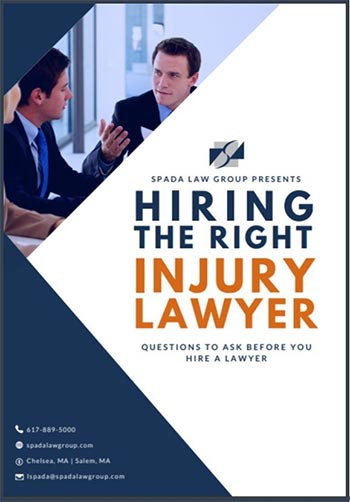Can a Massachusetts Parent be Held Liable for a Teen’s Car Accident? Boston Injury Attorney Explains Parental Liability

For many of us, this coronavirus pandemic season has been a season of less. Less going out, less activity, and less commuting, to name a few. It’s no different for our kids - whether your teens were away at college without a car, or at home without too many places to go, it's possible that their driving might be a little rusty.
With summer around the corner and with society finally returning to normal, it’s a very important time to have a conversation with your teens about driving safely. Not only do we all want our children to be safe, it’s also vital to be aware that as a parent it’s possible for you to be held liable for your teen’s car accident both under statutory and common law in Massachusetts.
How Parents’ Negligence can Lead to Liability for Their Teens Driving and Accidents
While a parent is not automatically responsible for a car accident caused by their teen or thier driving, it is possible for the parent to be held liable for their children’s actions. Typically, parents are more likely to be deemed responsible for their teen’s car accidents if the parents were negligent in failing to correct or prevent dangerous driving habits they were aware of.
If, for example, someone’s teen received a number of traffic violations or was frequently observed driving recklessly or incompetently, it is incumbent upon the parents to prevent their teen from harming or injuring others. Parents need to act when aware of their teens reckless or incompetent tendencies behind the wheel.
If a teen has a pattern of unsafe driving behaviors, and it leads to a Massachusetts car crash in which people are injured or killed, the parent can be deemed liable for the accident due to negligence.
Parental Negligence for Teen Drivers: Two Types Explained
There are two main types of negligence for which a parent could be held liable and responsible for their child’s car accident.
1. Negligent Entrustment
- Negligent entrustment is a bit more difficult to prove than negligent supervision.
- In order for a parent to be liable for a teen’s car accident due to negligent entrustment, it must be found that the parent trusted the vehicle to their teen knowing that the teen was unfit to drive safely, and the accident caused injuries due to the teen’s unfit driving.
- The parent also must have given the teen specific or general permission to drive their car AND have actual awareness of the teen’s unfit driving behaviors to be held responsible for “negligent entrustment”
- In effect, the parent must be aware of the teen’s unfit driving at the time the parent grants the teen permission to drive to be found guilty of negligent entrustment in the event of an accident.
2. Negligent Supervision
- A Massachusetts' court case ruled that parents have a duty to, within reason, prevent their minor child from intentionally or negligently harming or injuring others.
- A parent could be deemed negligent in supervision if the harmful conduct was known or complained of and parents had an opportunity to take corrective measures but failed to do so.
- Proving negligent supervision requires proving that the parent(s) had an awareness of the minor’s “dangerous tendency” and that the parent neglected to take appropriate corrective action.
- Basically, if the car accident was caused by an action that a reasonable parent - had they known about the behavior - would have led to closer supervision, then the parent(s) may be found liable.
When a Teen is “At Fault” for a Car Accident, there May Be Many Possible Liable Parties
It is possible for an injured party, or a survivor of a deceased loved one, to file a lawsuit against the teen driver, as well as the parents, and even possibly a third-party in the event of a car accident with injuries or death.
In general, the owner of the car is held responsible for damages no matter the driver, depending on the circumstances of the specific car accident. This is no different for parents, and parents can be found responsible for the act’s of their teen while driving. Rare exceptions to this rule include if a car is stolen and then involved in an accident.
If insured, the car owner’s insurance should have some form of personal injury protection to cover medical bills and lost earnings for those injured. The insurance should also include some form of liability insurance which will pay for damages including pain and suffering.
If, as described above, the parent is aware the teen had dangerous driving habits and didn’t take action and allowed their teen to continue to drive anyways, the parent could face an injury lawsuit for any injuries caused by their teen’s driving.
Third-parties may also be held liable for a teen’s car accident resulting in injuries or death in Massachusetts. If the teen was driving drunk, or under any influence of alcohol, for example, the party that served the alcohol - whether a bar or even an adult at a house party - can be held liable for the car accident and the injuries caused. The same is true if a supermarket or liquor store sold alcohol to a minor.
Common Teen Driver Dangers Explained by Car Accident Attorney
More than 2,000 people are killed in car accidents involving teen drivers each year, reports the U.S. National Highway Traffic Safety Administration (NHTSA). An additional 2,000 are injured in car accidents. In Massachusetts alone, there are almost 900 emergency room visits for 16 and 17 year old non-fatal car crashes.
Risk factors for teen drivers:
- Teen drivers have a higher rate of fatal crashes than adults - this is largely attributed to immaturity, lack of skill and experience.
- Teens are more likely to speed, make mistakes and be easily distracted.
- Texting while driving increases the risk of a car crash by 23 times, according to research.
- Teens are less likely to wear a seatbelt. Nearly half of teen car accident deaths occur when the teens are not wearing a seatbelt. Seatbelts save lives and protect from airbar injuries.
- Distracted driving: in addition to phone use, eating while driving, applying makeup, changing the radio and more can be dangerous distractions.
- Friends: With even just one teen passenger, research shows teens are 2.5x more likely to engage in potentially risky behaviors than if driving alone. The more teens in a car, the more the rate of a fatal crash increases.
Tips for teaching teens safe driving practices:
- Most importantly: be a good role model. Model good driving practices for your children and teens. Practice driving skills with your teen.
- Speed limit: model responsible driving by driving the speed limit, and be proactive about addressing any speeding tendencies with your teen.
- Talk to your teen about always wearing a seatbelt, restricting night driving, passengers, and not using phones while driving.
- Remind your teen the importance of giving driving their full attention. Text, phone calls, and anything else can wait. Talk about consequences for distracted driving.
- Talk to your teen about the dangers of drug and alcohol use. Talk about the dangers of any level of drugs or alcohol in their system when they drive.
- Advise your teen to never get in a car with a driver who has been drinking or using drugs - whether the driver is an adult or a teen.
- Learn more at NHTSA’s teen driving page.
Injured by a Teen Driver in Massachusetts? Contact our Boston-based Injury Attorney Today
After a car accident the last thing you need is to choose the wrong lawyer to help guide you through the legal process of getting compensated. Choosing the right injury lawyer for you and your situation is a major decision, and we sincerely want to help you make the right choice.
Get your FREE “Hiring the Right Injury Lawyer” booklet here.



